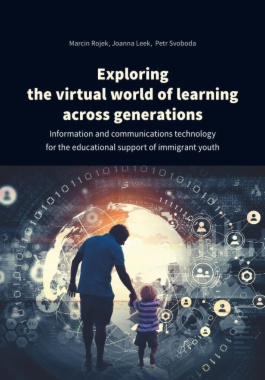The idea for this book came about as a result of the ICT Guides project, which was funded by the Erasmus+ programme . The project was carried out in 2015-2018 in Gothenburg (Sweden), Berlin (Germany), Madrid (Spain) and Sheffield (United Kingdom). The cities identified for the project all have a relatively high percentage of young school students with immigrant backgrounds. This group of Europeans in particular are at risk of early school leaving, and are over-represented in terms of unemployment.
The book addresses the issue of information and communication technology (ICT) use in an educational environment, and presents research results from the ICT Guides project. In order to discuss how ICT can be used as a means to prevent early school leaving among immigrant youth, this book explores the literature on how learning can be understood in the intergenerational context (Chapter 1); what the challenges are in preventing early school leaving (Chapter 2), and the prospects for ICT in education (Chapter 3). Finally, we present the findings of an empirical study on intergenerational learning with the use of information and communications technology (Chapter 4).
As reports on youth in Europe show, young immigrants are most at risk of social exclusion. Employment is a strong protective factor against the risk of poverty, and – as identified in the EU 2020 strategy – one of the most important targets for a smart, sustainable and inclusive Europe. Immigrant youths suffer from having an incomplete education, partly because of the economic crisis in Europe, and partly because of the military conflicts and strife in places such as Syria and Afghanistan.
Our findings highlight the fact that ICT-supported learning is a significant sociocultural platform for knowledge exchange, at the same time reducing intergenerational and cultural distance. It helps work toward the common good, creates a sense of belonging and ensures mutual support, and encourages better understanding and harmonious coexistence between young immigrants and older citizens. The function of ICT in intergenerational learning is changing, from serving as its catalyst to facilitating its participants’ learning about each other.
- OKLADKA
- Table of contents
- Introduction
- Chapter 1 Intergenerational learning in contemporary education - a theoretical justification of the ICT Guides project
Marcin Rojek
- Introduction
- 1.1. Learning in preference to education
- 1.1.1. The behaviourist approach to learning
- 1.1.2. Cognitive learning
- 1.1.3. Social learning
- 1.1.4. The transformative approach to learning
- 1.1.5. The three dimensions of learning by Knud Illeris
- 1.2. The potential of intergenerational learning in educational problem solving
- 1.2.1. The educational potential of generations
- 1.2.2. Intergenerational learning as empowerment
- Summary
- Chapter II Immigrant youth education and early school leaving - challenges to contemporary education Joanna Leek
- Introduction
- 2.1. Education of immigrant youth - an overview
- 2.2. Youths - between early school leaving and social exclusion
- 2.3. Profile of the early school leaver
- 2.4. Supporting the educational attainment of youths - recommendations for policy and practice
- Summary
- Chapter III Information and communications technology - a prospective approach to education Petr Svoboda
- Introduction
- 3.1. Information and communications technology (ICT) in education
- 3.1.1. New technologies and the current most frequently-used didactic tools
- 3.1.2. New tools in distance education and blended learning
- 3.1.3. Advantages and barriers in the use of new technologies in education
- 3.1.4. Extension of new technologies in education
- 3.2. Digital literacy and its development
- 3.3. Digital technology in education
- 3.3.1. Digital technology in pedagogical activities
- 3.3.2. Application of digital technology in education
- 3.3.3. Digital competence
- 3.4. ICT in informal education
- 3.4.1. M-learning - new methods and forms of education
- 3.4.2. The goals and purpose of m-learning
- 3.4.3. Mobile technology in teaching
- 3.4.4. Innovations in education using cloud computing
- 3.4.5. The benefits of online collaboration in education
- Summary
- Chapter IV The findings of the ICT Guides Joanna Leek, Marcin Rojek
- Introduction
- 4.1. Cases studies - the intergenerational learning courses
- 4.1.1. The intergenerational courses held in Berlin
- 4.1.2. The intergenerational courses held in Gothenburg
- 4.1.3. Intergenerational learning courses conducted in Madrid
- 4.1.4. The intergenerational courses held in Sheffield
- 4.2. General conclusions from the project
- Summary
- BIBLIOGRAPHY
- Biogram

